Evaluation of Mindfulness-Based Stress Reduction Program (PSY30011)
VerifiedAdded on 2022/09/12
|10
|2469
|26
Report
AI Summary
This report provides an evaluation of a Mindfulness-Based Stress Reduction (MBSR) program, specifically focusing on an online course offered in Australia. The program, designed to improve wellbeing through mindfulness practices, is critically reviewed, examining its components such as psychological regulation, emotional awareness, cognitive flexibility, engagement with values, and behavioral change. The report highlights the program's structure, its emphasis on practical application, and its ability to foster connection. It delves into the critical review of the program, discussing the views of experts, the role of reflective practices, and the effectiveness of online delivery compared to traditional, site-based courses. The report also considers the limitations of the program, such as the need for personal interaction and the importance of social support. Finally, it concludes with a summary of the program's effectiveness, recommending further research to explore the impact of these types of programs on diverse populations and their implications for overall wellbeing.
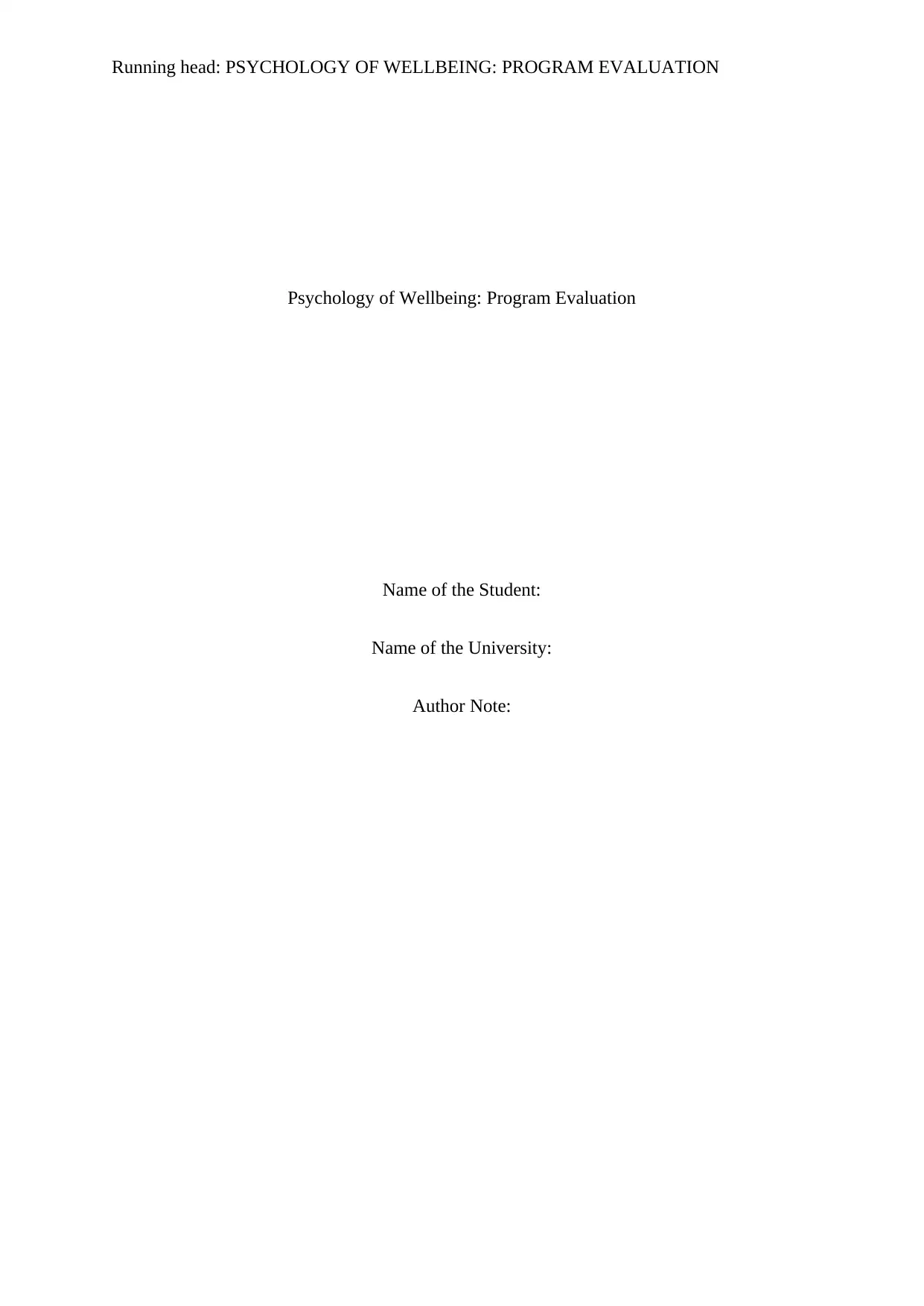
Running head: PSYCHOLOGY OF WELLBEING: PROGRAM EVALUATION
Psychology of Wellbeing: Program Evaluation
Name of the Student:
Name of the University:
Author Note:
Psychology of Wellbeing: Program Evaluation
Name of the Student:
Name of the University:
Author Note:
Paraphrase This Document
Need a fresh take? Get an instant paraphrase of this document with our AI Paraphraser
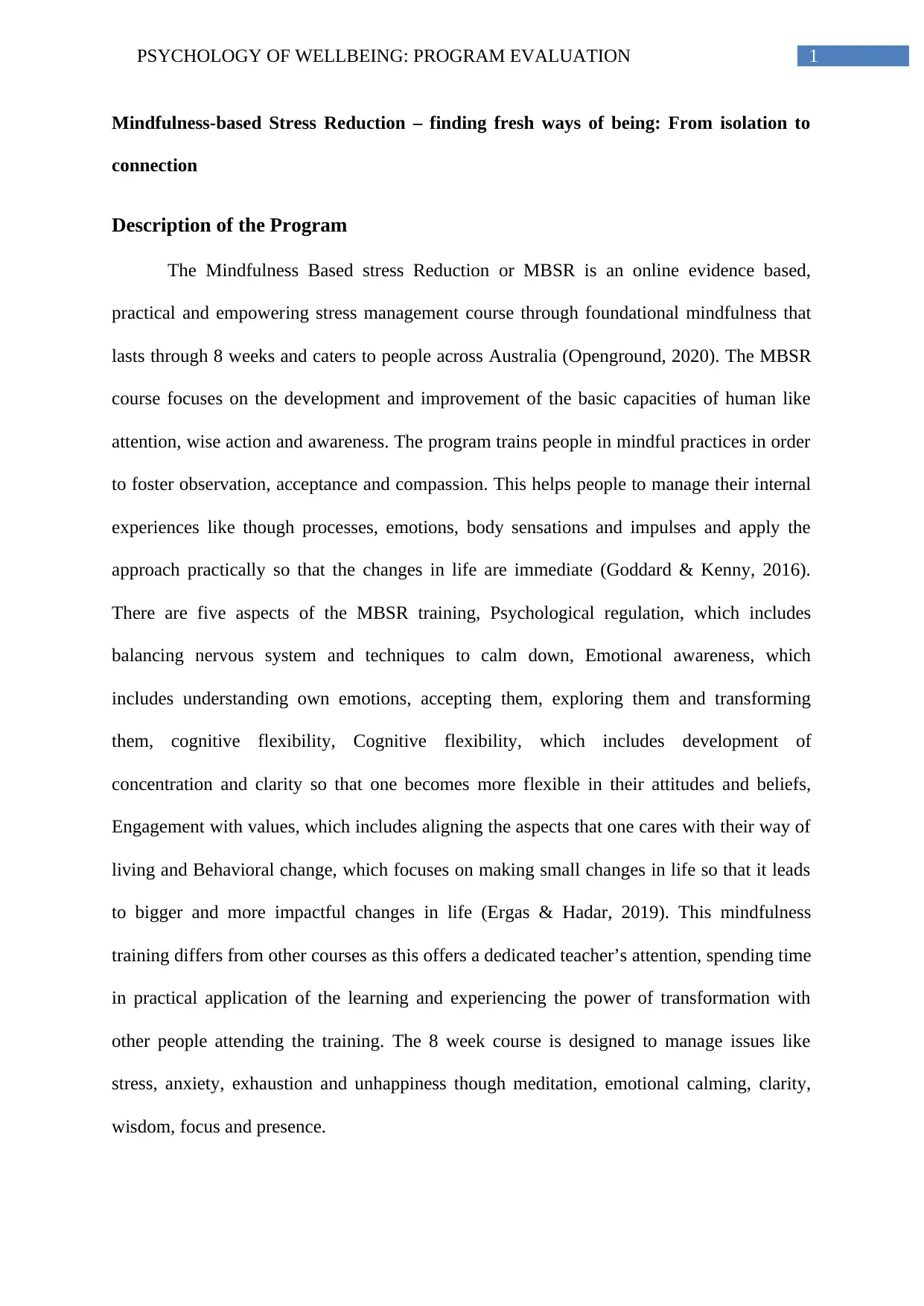
1PSYCHOLOGY OF WELLBEING: PROGRAM EVALUATION
Mindfulness-based Stress Reduction – finding fresh ways of being: From isolation to
connection
Description of the Program
The Mindfulness Based stress Reduction or MBSR is an online evidence based,
practical and empowering stress management course through foundational mindfulness that
lasts through 8 weeks and caters to people across Australia (Openground, 2020). The MBSR
course focuses on the development and improvement of the basic capacities of human like
attention, wise action and awareness. The program trains people in mindful practices in order
to foster observation, acceptance and compassion. This helps people to manage their internal
experiences like though processes, emotions, body sensations and impulses and apply the
approach practically so that the changes in life are immediate (Goddard & Kenny, 2016).
There are five aspects of the MBSR training, Psychological regulation, which includes
balancing nervous system and techniques to calm down, Emotional awareness, which
includes understanding own emotions, accepting them, exploring them and transforming
them, cognitive flexibility, Cognitive flexibility, which includes development of
concentration and clarity so that one becomes more flexible in their attitudes and beliefs,
Engagement with values, which includes aligning the aspects that one cares with their way of
living and Behavioral change, which focuses on making small changes in life so that it leads
to bigger and more impactful changes in life (Ergas & Hadar, 2019). This mindfulness
training differs from other courses as this offers a dedicated teacher’s attention, spending time
in practical application of the learning and experiencing the power of transformation with
other people attending the training. The 8 week course is designed to manage issues like
stress, anxiety, exhaustion and unhappiness though meditation, emotional calming, clarity,
wisdom, focus and presence.
Mindfulness-based Stress Reduction – finding fresh ways of being: From isolation to
connection
Description of the Program
The Mindfulness Based stress Reduction or MBSR is an online evidence based,
practical and empowering stress management course through foundational mindfulness that
lasts through 8 weeks and caters to people across Australia (Openground, 2020). The MBSR
course focuses on the development and improvement of the basic capacities of human like
attention, wise action and awareness. The program trains people in mindful practices in order
to foster observation, acceptance and compassion. This helps people to manage their internal
experiences like though processes, emotions, body sensations and impulses and apply the
approach practically so that the changes in life are immediate (Goddard & Kenny, 2016).
There are five aspects of the MBSR training, Psychological regulation, which includes
balancing nervous system and techniques to calm down, Emotional awareness, which
includes understanding own emotions, accepting them, exploring them and transforming
them, cognitive flexibility, Cognitive flexibility, which includes development of
concentration and clarity so that one becomes more flexible in their attitudes and beliefs,
Engagement with values, which includes aligning the aspects that one cares with their way of
living and Behavioral change, which focuses on making small changes in life so that it leads
to bigger and more impactful changes in life (Ergas & Hadar, 2019). This mindfulness
training differs from other courses as this offers a dedicated teacher’s attention, spending time
in practical application of the learning and experiencing the power of transformation with
other people attending the training. The 8 week course is designed to manage issues like
stress, anxiety, exhaustion and unhappiness though meditation, emotional calming, clarity,
wisdom, focus and presence.
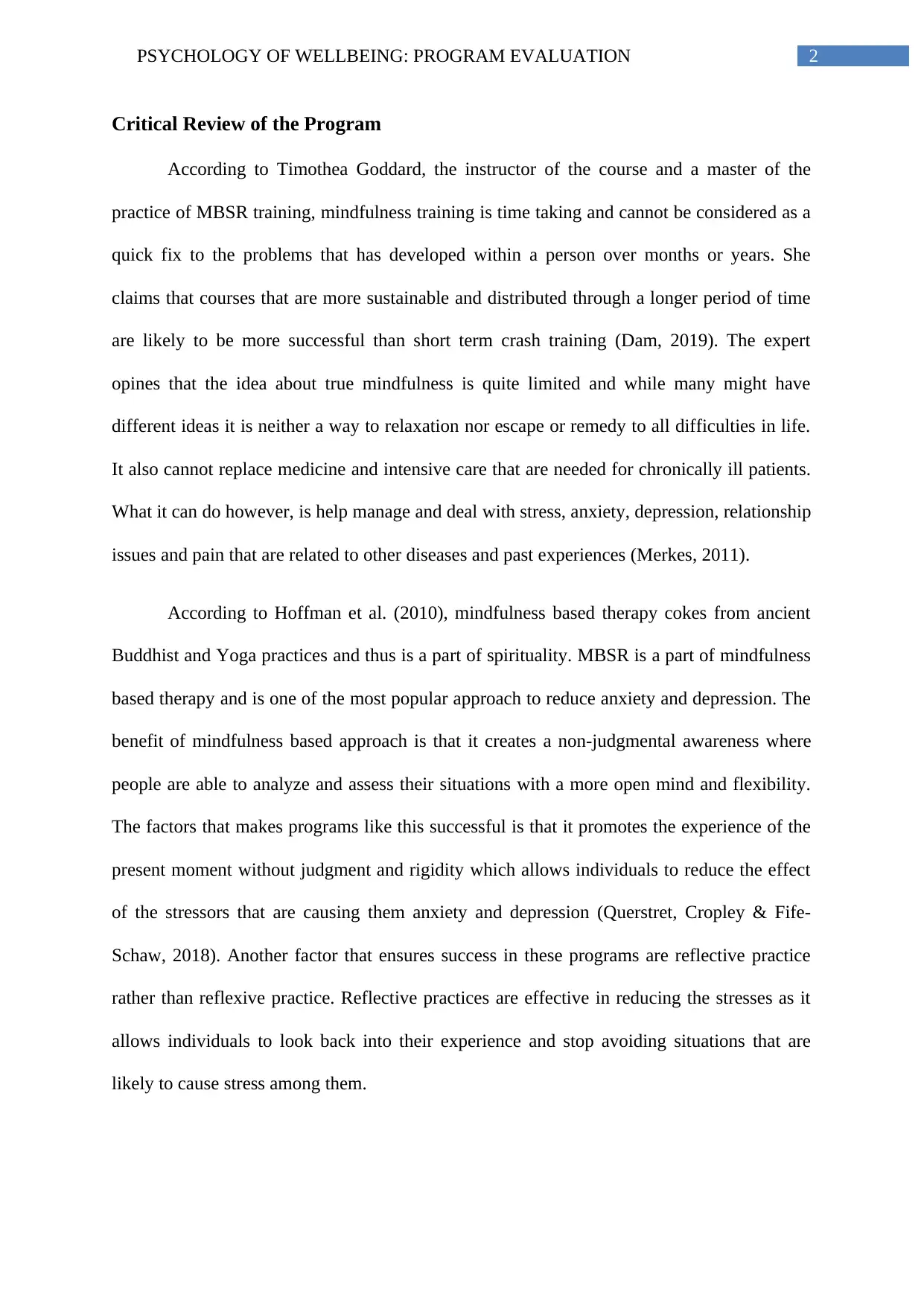
2PSYCHOLOGY OF WELLBEING: PROGRAM EVALUATION
Critical Review of the Program
According to Timothea Goddard, the instructor of the course and a master of the
practice of MBSR training, mindfulness training is time taking and cannot be considered as a
quick fix to the problems that has developed within a person over months or years. She
claims that courses that are more sustainable and distributed through a longer period of time
are likely to be more successful than short term crash training (Dam, 2019). The expert
opines that the idea about true mindfulness is quite limited and while many might have
different ideas it is neither a way to relaxation nor escape or remedy to all difficulties in life.
It also cannot replace medicine and intensive care that are needed for chronically ill patients.
What it can do however, is help manage and deal with stress, anxiety, depression, relationship
issues and pain that are related to other diseases and past experiences (Merkes, 2011).
According to Hoffman et al. (2010), mindfulness based therapy cokes from ancient
Buddhist and Yoga practices and thus is a part of spirituality. MBSR is a part of mindfulness
based therapy and is one of the most popular approach to reduce anxiety and depression. The
benefit of mindfulness based approach is that it creates a non-judgmental awareness where
people are able to analyze and assess their situations with a more open mind and flexibility.
The factors that makes programs like this successful is that it promotes the experience of the
present moment without judgment and rigidity which allows individuals to reduce the effect
of the stressors that are causing them anxiety and depression (Querstret, Cropley & Fife-
Schaw, 2018). Another factor that ensures success in these programs are reflective practice
rather than reflexive practice. Reflective practices are effective in reducing the stresses as it
allows individuals to look back into their experience and stop avoiding situations that are
likely to cause stress among them.
Critical Review of the Program
According to Timothea Goddard, the instructor of the course and a master of the
practice of MBSR training, mindfulness training is time taking and cannot be considered as a
quick fix to the problems that has developed within a person over months or years. She
claims that courses that are more sustainable and distributed through a longer period of time
are likely to be more successful than short term crash training (Dam, 2019). The expert
opines that the idea about true mindfulness is quite limited and while many might have
different ideas it is neither a way to relaxation nor escape or remedy to all difficulties in life.
It also cannot replace medicine and intensive care that are needed for chronically ill patients.
What it can do however, is help manage and deal with stress, anxiety, depression, relationship
issues and pain that are related to other diseases and past experiences (Merkes, 2011).
According to Hoffman et al. (2010), mindfulness based therapy cokes from ancient
Buddhist and Yoga practices and thus is a part of spirituality. MBSR is a part of mindfulness
based therapy and is one of the most popular approach to reduce anxiety and depression. The
benefit of mindfulness based approach is that it creates a non-judgmental awareness where
people are able to analyze and assess their situations with a more open mind and flexibility.
The factors that makes programs like this successful is that it promotes the experience of the
present moment without judgment and rigidity which allows individuals to reduce the effect
of the stressors that are causing them anxiety and depression (Querstret, Cropley & Fife-
Schaw, 2018). Another factor that ensures success in these programs are reflective practice
rather than reflexive practice. Reflective practices are effective in reducing the stresses as it
allows individuals to look back into their experience and stop avoiding situations that are
likely to cause stress among them.
⊘ This is a preview!⊘
Do you want full access?
Subscribe today to unlock all pages.

Trusted by 1+ million students worldwide
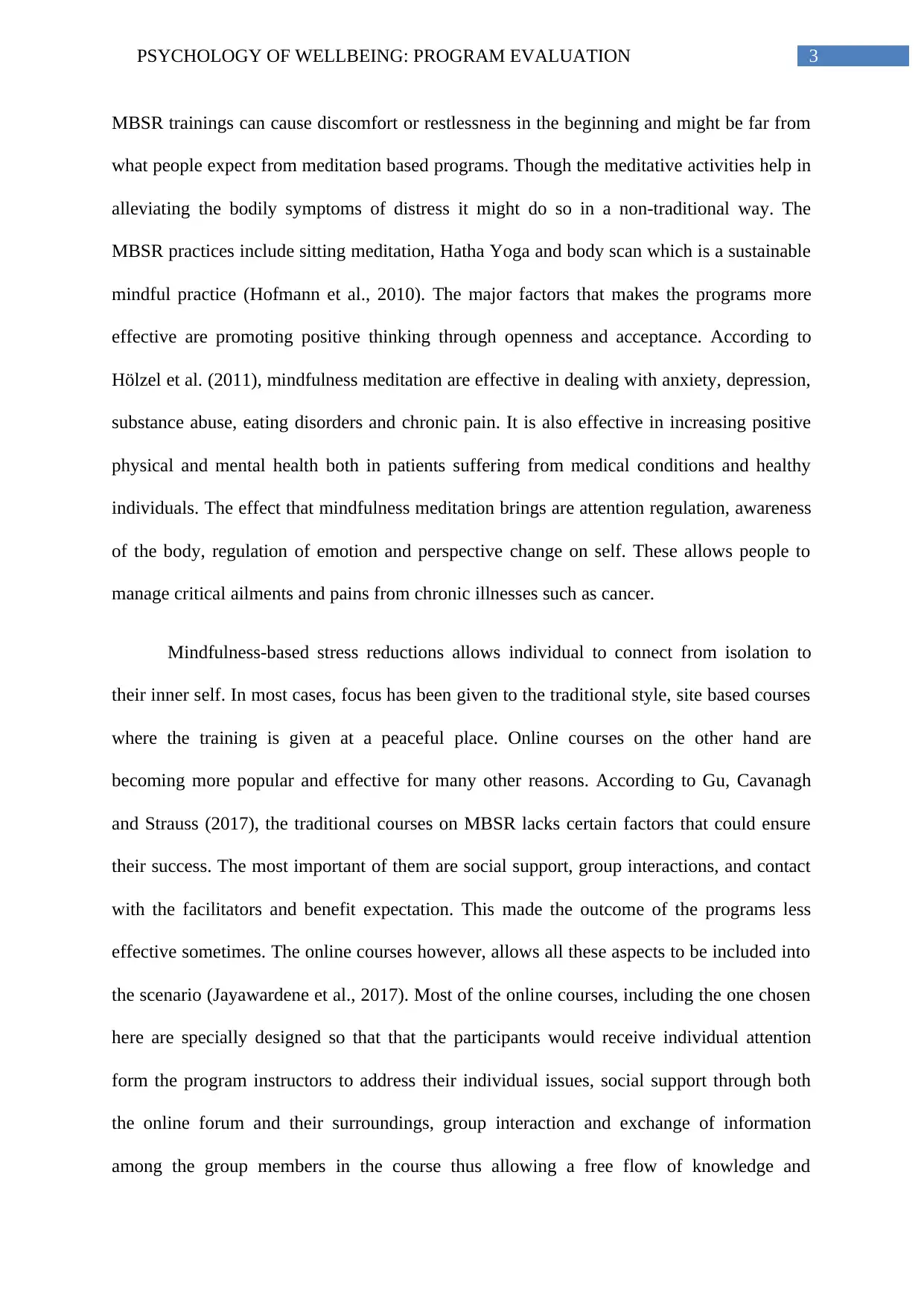
3PSYCHOLOGY OF WELLBEING: PROGRAM EVALUATION
MBSR trainings can cause discomfort or restlessness in the beginning and might be far from
what people expect from meditation based programs. Though the meditative activities help in
alleviating the bodily symptoms of distress it might do so in a non-traditional way. The
MBSR practices include sitting meditation, Hatha Yoga and body scan which is a sustainable
mindful practice (Hofmann et al., 2010). The major factors that makes the programs more
effective are promoting positive thinking through openness and acceptance. According to
Hölzel et al. (2011), mindfulness meditation are effective in dealing with anxiety, depression,
substance abuse, eating disorders and chronic pain. It is also effective in increasing positive
physical and mental health both in patients suffering from medical conditions and healthy
individuals. The effect that mindfulness meditation brings are attention regulation, awareness
of the body, regulation of emotion and perspective change on self. These allows people to
manage critical ailments and pains from chronic illnesses such as cancer.
Mindfulness-based stress reductions allows individual to connect from isolation to
their inner self. In most cases, focus has been given to the traditional style, site based courses
where the training is given at a peaceful place. Online courses on the other hand are
becoming more popular and effective for many other reasons. According to Gu, Cavanagh
and Strauss (2017), the traditional courses on MBSR lacks certain factors that could ensure
their success. The most important of them are social support, group interactions, and contact
with the facilitators and benefit expectation. This made the outcome of the programs less
effective sometimes. The online courses however, allows all these aspects to be included into
the scenario (Jayawardene et al., 2017). Most of the online courses, including the one chosen
here are specially designed so that that the participants would receive individual attention
form the program instructors to address their individual issues, social support through both
the online forum and their surroundings, group interaction and exchange of information
among the group members in the course thus allowing a free flow of knowledge and
MBSR trainings can cause discomfort or restlessness in the beginning and might be far from
what people expect from meditation based programs. Though the meditative activities help in
alleviating the bodily symptoms of distress it might do so in a non-traditional way. The
MBSR practices include sitting meditation, Hatha Yoga and body scan which is a sustainable
mindful practice (Hofmann et al., 2010). The major factors that makes the programs more
effective are promoting positive thinking through openness and acceptance. According to
Hölzel et al. (2011), mindfulness meditation are effective in dealing with anxiety, depression,
substance abuse, eating disorders and chronic pain. It is also effective in increasing positive
physical and mental health both in patients suffering from medical conditions and healthy
individuals. The effect that mindfulness meditation brings are attention regulation, awareness
of the body, regulation of emotion and perspective change on self. These allows people to
manage critical ailments and pains from chronic illnesses such as cancer.
Mindfulness-based stress reductions allows individual to connect from isolation to
their inner self. In most cases, focus has been given to the traditional style, site based courses
where the training is given at a peaceful place. Online courses on the other hand are
becoming more popular and effective for many other reasons. According to Gu, Cavanagh
and Strauss (2017), the traditional courses on MBSR lacks certain factors that could ensure
their success. The most important of them are social support, group interactions, and contact
with the facilitators and benefit expectation. This made the outcome of the programs less
effective sometimes. The online courses however, allows all these aspects to be included into
the scenario (Jayawardene et al., 2017). Most of the online courses, including the one chosen
here are specially designed so that that the participants would receive individual attention
form the program instructors to address their individual issues, social support through both
the online forum and their surroundings, group interaction and exchange of information
among the group members in the course thus allowing a free flow of knowledge and
Paraphrase This Document
Need a fresh take? Get an instant paraphrase of this document with our AI Paraphraser
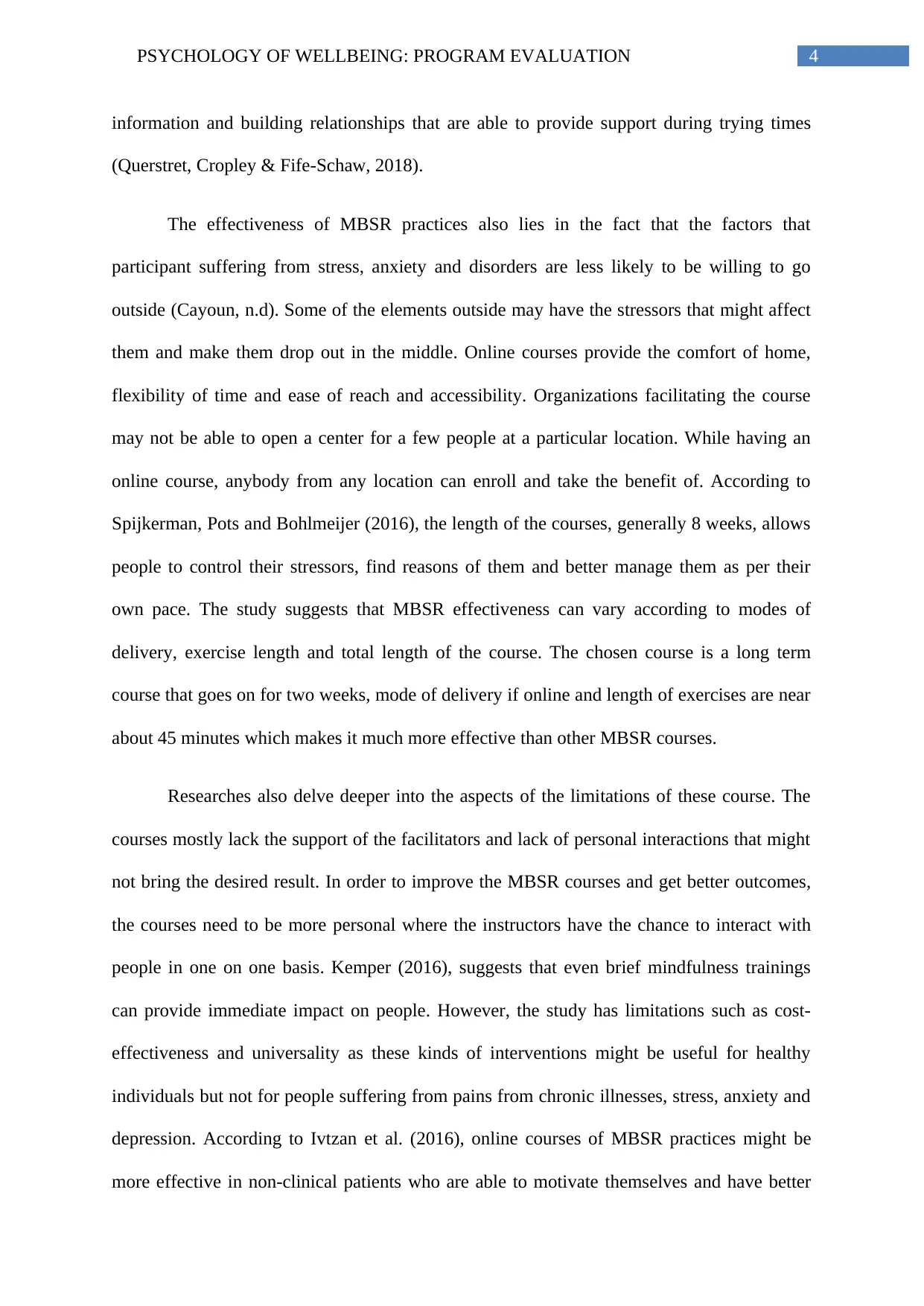
4PSYCHOLOGY OF WELLBEING: PROGRAM EVALUATION
information and building relationships that are able to provide support during trying times
(Querstret, Cropley & Fife-Schaw, 2018).
The effectiveness of MBSR practices also lies in the fact that the factors that
participant suffering from stress, anxiety and disorders are less likely to be willing to go
outside (Cayoun, n.d). Some of the elements outside may have the stressors that might affect
them and make them drop out in the middle. Online courses provide the comfort of home,
flexibility of time and ease of reach and accessibility. Organizations facilitating the course
may not be able to open a center for a few people at a particular location. While having an
online course, anybody from any location can enroll and take the benefit of. According to
Spijkerman, Pots and Bohlmeijer (2016), the length of the courses, generally 8 weeks, allows
people to control their stressors, find reasons of them and better manage them as per their
own pace. The study suggests that MBSR effectiveness can vary according to modes of
delivery, exercise length and total length of the course. The chosen course is a long term
course that goes on for two weeks, mode of delivery if online and length of exercises are near
about 45 minutes which makes it much more effective than other MBSR courses.
Researches also delve deeper into the aspects of the limitations of these course. The
courses mostly lack the support of the facilitators and lack of personal interactions that might
not bring the desired result. In order to improve the MBSR courses and get better outcomes,
the courses need to be more personal where the instructors have the chance to interact with
people in one on one basis. Kemper (2016), suggests that even brief mindfulness trainings
can provide immediate impact on people. However, the study has limitations such as cost-
effectiveness and universality as these kinds of interventions might be useful for healthy
individuals but not for people suffering from pains from chronic illnesses, stress, anxiety and
depression. According to Ivtzan et al. (2016), online courses of MBSR practices might be
more effective in non-clinical patients who are able to motivate themselves and have better
information and building relationships that are able to provide support during trying times
(Querstret, Cropley & Fife-Schaw, 2018).
The effectiveness of MBSR practices also lies in the fact that the factors that
participant suffering from stress, anxiety and disorders are less likely to be willing to go
outside (Cayoun, n.d). Some of the elements outside may have the stressors that might affect
them and make them drop out in the middle. Online courses provide the comfort of home,
flexibility of time and ease of reach and accessibility. Organizations facilitating the course
may not be able to open a center for a few people at a particular location. While having an
online course, anybody from any location can enroll and take the benefit of. According to
Spijkerman, Pots and Bohlmeijer (2016), the length of the courses, generally 8 weeks, allows
people to control their stressors, find reasons of them and better manage them as per their
own pace. The study suggests that MBSR effectiveness can vary according to modes of
delivery, exercise length and total length of the course. The chosen course is a long term
course that goes on for two weeks, mode of delivery if online and length of exercises are near
about 45 minutes which makes it much more effective than other MBSR courses.
Researches also delve deeper into the aspects of the limitations of these course. The
courses mostly lack the support of the facilitators and lack of personal interactions that might
not bring the desired result. In order to improve the MBSR courses and get better outcomes,
the courses need to be more personal where the instructors have the chance to interact with
people in one on one basis. Kemper (2016), suggests that even brief mindfulness trainings
can provide immediate impact on people. However, the study has limitations such as cost-
effectiveness and universality as these kinds of interventions might be useful for healthy
individuals but not for people suffering from pains from chronic illnesses, stress, anxiety and
depression. According to Ivtzan et al. (2016), online courses of MBSR practices might be
more effective in non-clinical patients who are able to motivate themselves and have better
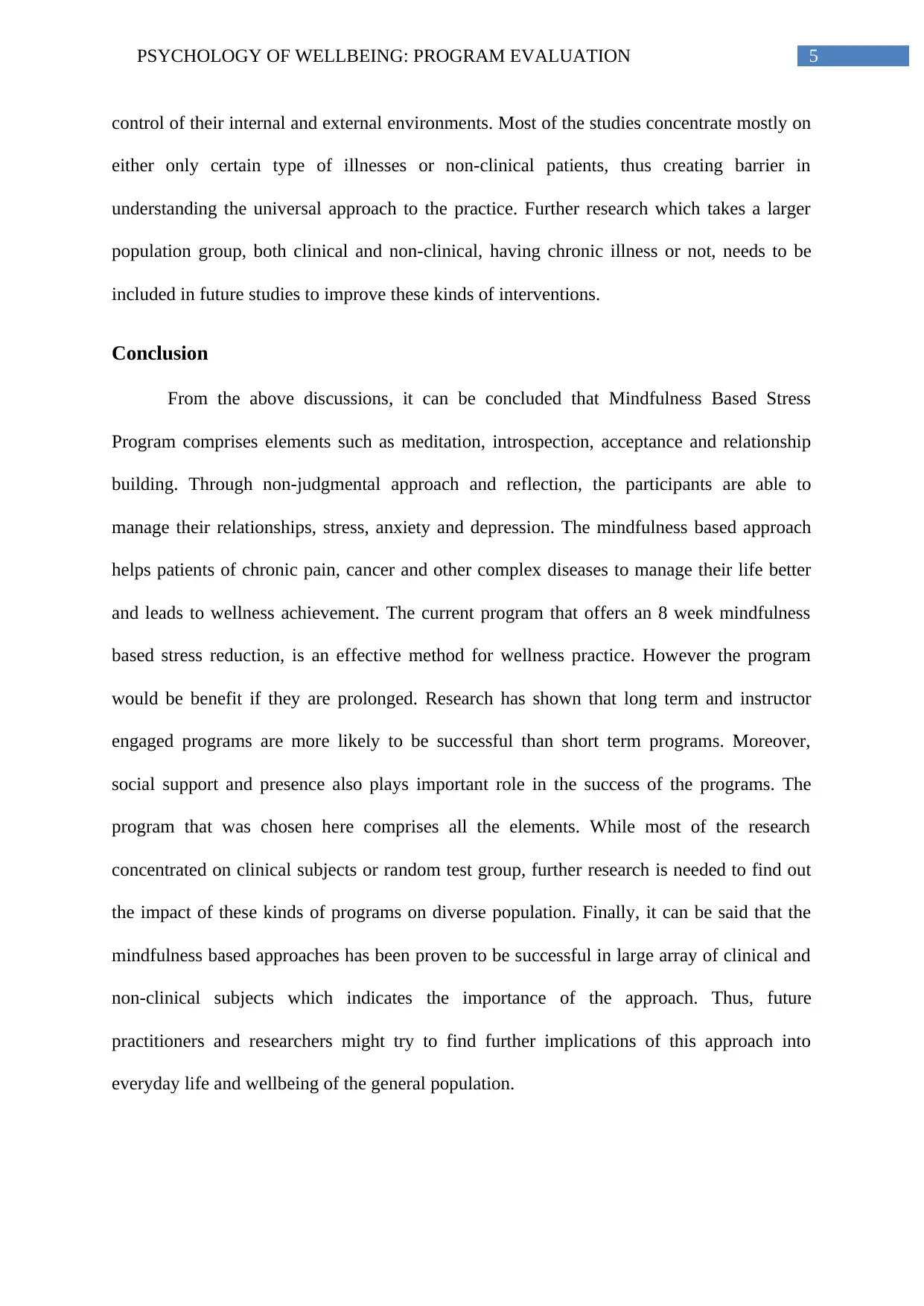
5PSYCHOLOGY OF WELLBEING: PROGRAM EVALUATION
control of their internal and external environments. Most of the studies concentrate mostly on
either only certain type of illnesses or non-clinical patients, thus creating barrier in
understanding the universal approach to the practice. Further research which takes a larger
population group, both clinical and non-clinical, having chronic illness or not, needs to be
included in future studies to improve these kinds of interventions.
Conclusion
From the above discussions, it can be concluded that Mindfulness Based Stress
Program comprises elements such as meditation, introspection, acceptance and relationship
building. Through non-judgmental approach and reflection, the participants are able to
manage their relationships, stress, anxiety and depression. The mindfulness based approach
helps patients of chronic pain, cancer and other complex diseases to manage their life better
and leads to wellness achievement. The current program that offers an 8 week mindfulness
based stress reduction, is an effective method for wellness practice. However the program
would be benefit if they are prolonged. Research has shown that long term and instructor
engaged programs are more likely to be successful than short term programs. Moreover,
social support and presence also plays important role in the success of the programs. The
program that was chosen here comprises all the elements. While most of the research
concentrated on clinical subjects or random test group, further research is needed to find out
the impact of these kinds of programs on diverse population. Finally, it can be said that the
mindfulness based approaches has been proven to be successful in large array of clinical and
non-clinical subjects which indicates the importance of the approach. Thus, future
practitioners and researchers might try to find further implications of this approach into
everyday life and wellbeing of the general population.
control of their internal and external environments. Most of the studies concentrate mostly on
either only certain type of illnesses or non-clinical patients, thus creating barrier in
understanding the universal approach to the practice. Further research which takes a larger
population group, both clinical and non-clinical, having chronic illness or not, needs to be
included in future studies to improve these kinds of interventions.
Conclusion
From the above discussions, it can be concluded that Mindfulness Based Stress
Program comprises elements such as meditation, introspection, acceptance and relationship
building. Through non-judgmental approach and reflection, the participants are able to
manage their relationships, stress, anxiety and depression. The mindfulness based approach
helps patients of chronic pain, cancer and other complex diseases to manage their life better
and leads to wellness achievement. The current program that offers an 8 week mindfulness
based stress reduction, is an effective method for wellness practice. However the program
would be benefit if they are prolonged. Research has shown that long term and instructor
engaged programs are more likely to be successful than short term programs. Moreover,
social support and presence also plays important role in the success of the programs. The
program that was chosen here comprises all the elements. While most of the research
concentrated on clinical subjects or random test group, further research is needed to find out
the impact of these kinds of programs on diverse population. Finally, it can be said that the
mindfulness based approaches has been proven to be successful in large array of clinical and
non-clinical subjects which indicates the importance of the approach. Thus, future
practitioners and researchers might try to find further implications of this approach into
everyday life and wellbeing of the general population.
⊘ This is a preview!⊘
Do you want full access?
Subscribe today to unlock all pages.

Trusted by 1+ million students worldwide

6PSYCHOLOGY OF WELLBEING: PROGRAM EVALUATION
Paraphrase This Document
Need a fresh take? Get an instant paraphrase of this document with our AI Paraphraser
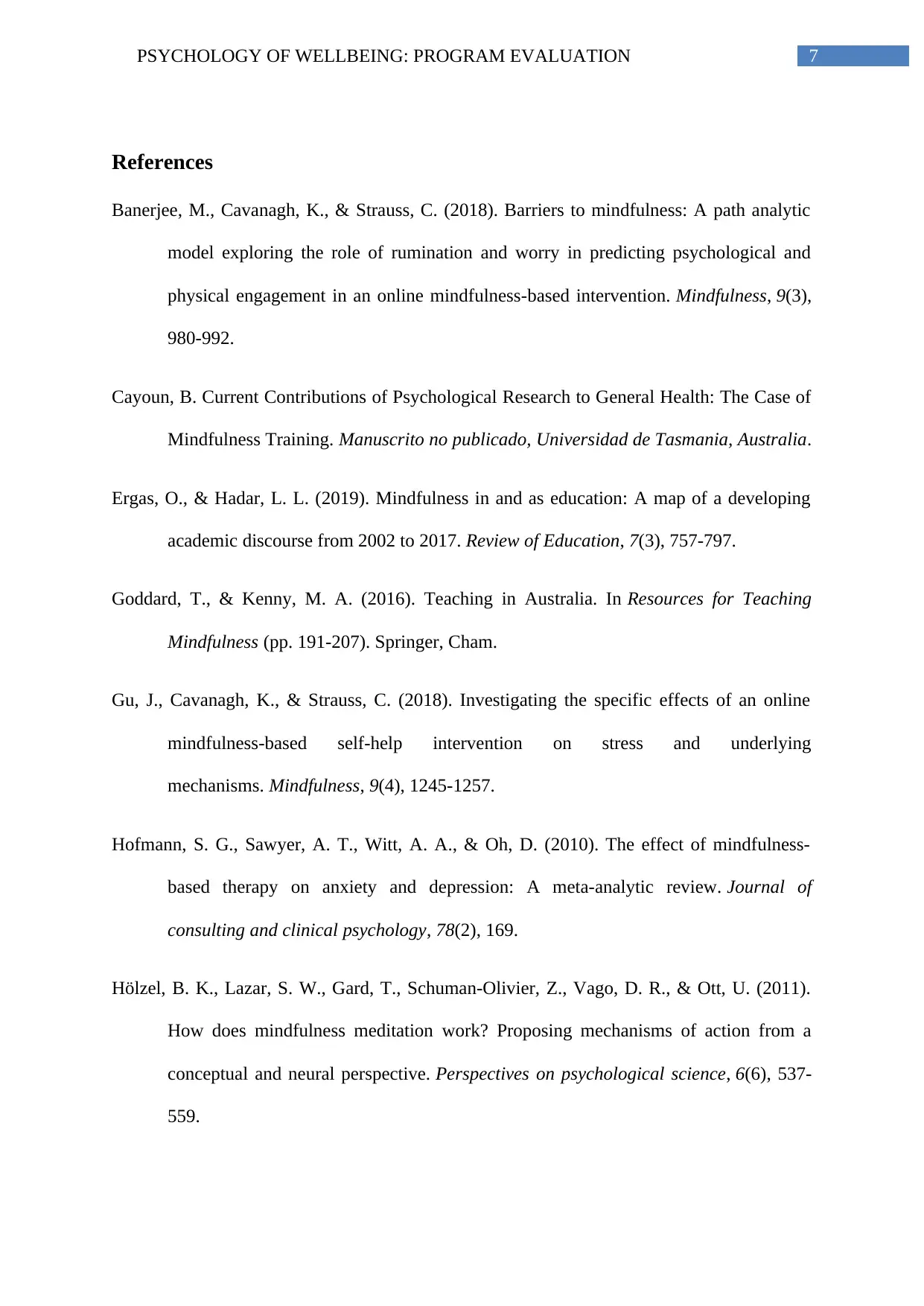
7PSYCHOLOGY OF WELLBEING: PROGRAM EVALUATION
References
Banerjee, M., Cavanagh, K., & Strauss, C. (2018). Barriers to mindfulness: A path analytic
model exploring the role of rumination and worry in predicting psychological and
physical engagement in an online mindfulness-based intervention. Mindfulness, 9(3),
980-992.
Cayoun, B. Current Contributions of Psychological Research to General Health: The Case of
Mindfulness Training. Manuscrito no publicado, Universidad de Tasmania, Australia.
Ergas, O., & Hadar, L. L. (2019). Mindfulness in and as education: A map of a developing
academic discourse from 2002 to 2017. Review of Education, 7(3), 757-797.
Goddard, T., & Kenny, M. A. (2016). Teaching in Australia. In Resources for Teaching
Mindfulness (pp. 191-207). Springer, Cham.
Gu, J., Cavanagh, K., & Strauss, C. (2018). Investigating the specific effects of an online
mindfulness-based self-help intervention on stress and underlying
mechanisms. Mindfulness, 9(4), 1245-1257.
Hofmann, S. G., Sawyer, A. T., Witt, A. A., & Oh, D. (2010). The effect of mindfulness-
based therapy on anxiety and depression: A meta-analytic review. Journal of
consulting and clinical psychology, 78(2), 169.
Hölzel, B. K., Lazar, S. W., Gard, T., Schuman-Olivier, Z., Vago, D. R., & Ott, U. (2011).
How does mindfulness meditation work? Proposing mechanisms of action from a
conceptual and neural perspective. Perspectives on psychological science, 6(6), 537-
559.
References
Banerjee, M., Cavanagh, K., & Strauss, C. (2018). Barriers to mindfulness: A path analytic
model exploring the role of rumination and worry in predicting psychological and
physical engagement in an online mindfulness-based intervention. Mindfulness, 9(3),
980-992.
Cayoun, B. Current Contributions of Psychological Research to General Health: The Case of
Mindfulness Training. Manuscrito no publicado, Universidad de Tasmania, Australia.
Ergas, O., & Hadar, L. L. (2019). Mindfulness in and as education: A map of a developing
academic discourse from 2002 to 2017. Review of Education, 7(3), 757-797.
Goddard, T., & Kenny, M. A. (2016). Teaching in Australia. In Resources for Teaching
Mindfulness (pp. 191-207). Springer, Cham.
Gu, J., Cavanagh, K., & Strauss, C. (2018). Investigating the specific effects of an online
mindfulness-based self-help intervention on stress and underlying
mechanisms. Mindfulness, 9(4), 1245-1257.
Hofmann, S. G., Sawyer, A. T., Witt, A. A., & Oh, D. (2010). The effect of mindfulness-
based therapy on anxiety and depression: A meta-analytic review. Journal of
consulting and clinical psychology, 78(2), 169.
Hölzel, B. K., Lazar, S. W., Gard, T., Schuman-Olivier, Z., Vago, D. R., & Ott, U. (2011).
How does mindfulness meditation work? Proposing mechanisms of action from a
conceptual and neural perspective. Perspectives on psychological science, 6(6), 537-
559.
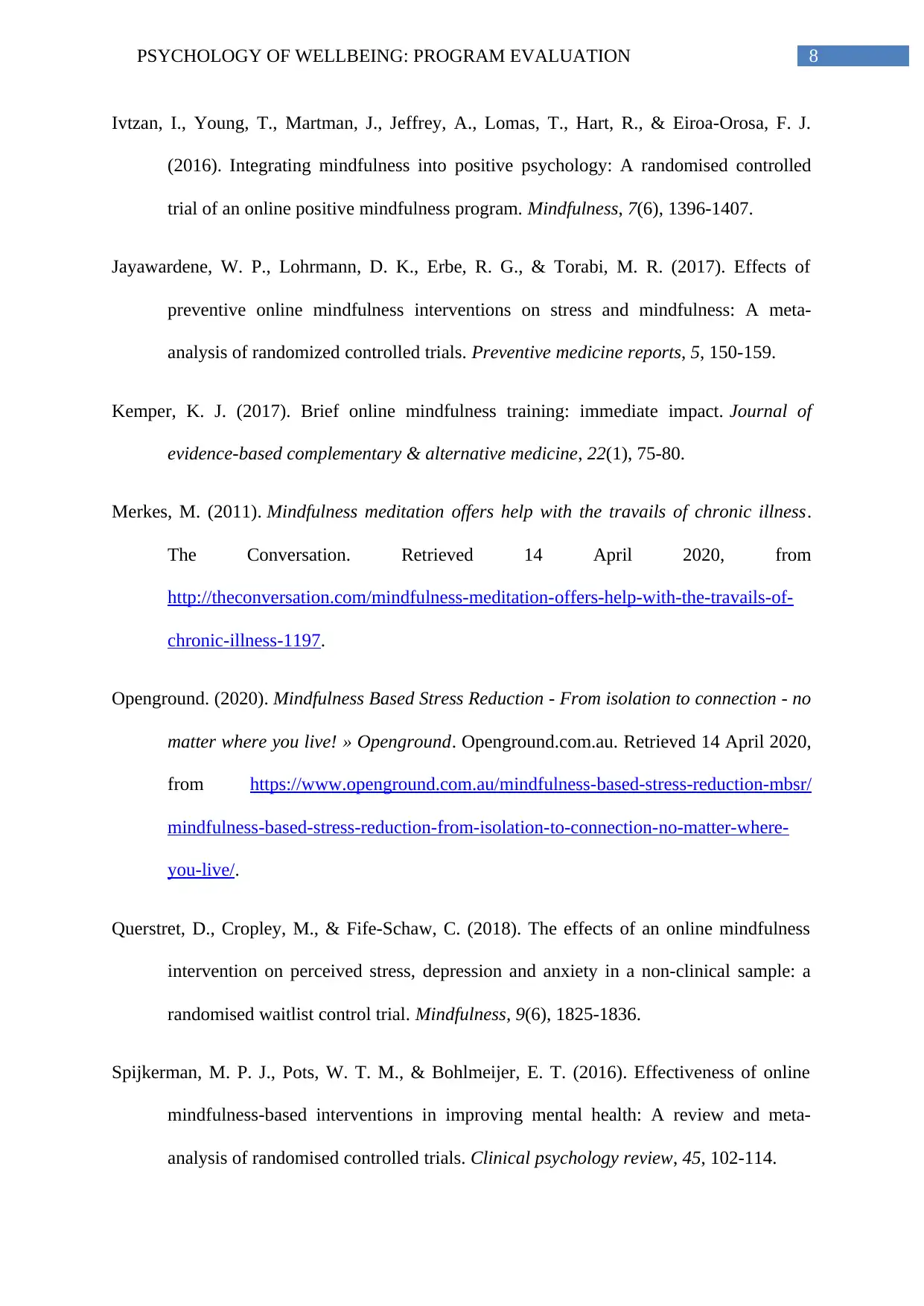
8PSYCHOLOGY OF WELLBEING: PROGRAM EVALUATION
Ivtzan, I., Young, T., Martman, J., Jeffrey, A., Lomas, T., Hart, R., & Eiroa-Orosa, F. J.
(2016). Integrating mindfulness into positive psychology: A randomised controlled
trial of an online positive mindfulness program. Mindfulness, 7(6), 1396-1407.
Jayawardene, W. P., Lohrmann, D. K., Erbe, R. G., & Torabi, M. R. (2017). Effects of
preventive online mindfulness interventions on stress and mindfulness: A meta-
analysis of randomized controlled trials. Preventive medicine reports, 5, 150-159.
Kemper, K. J. (2017). Brief online mindfulness training: immediate impact. Journal of
evidence-based complementary & alternative medicine, 22(1), 75-80.
Merkes, M. (2011). Mindfulness meditation offers help with the travails of chronic illness.
The Conversation. Retrieved 14 April 2020, from
http://theconversation.com/mindfulness-meditation-offers-help-with-the-travails-of-
chronic-illness-1197.
Openground. (2020). Mindfulness Based Stress Reduction - From isolation to connection - no
matter where you live! » Openground. Openground.com.au. Retrieved 14 April 2020,
from https://www.openground.com.au/mindfulness-based-stress-reduction-mbsr/
mindfulness-based-stress-reduction-from-isolation-to-connection-no-matter-where-
you-live/.
Querstret, D., Cropley, M., & Fife-Schaw, C. (2018). The effects of an online mindfulness
intervention on perceived stress, depression and anxiety in a non-clinical sample: a
randomised waitlist control trial. Mindfulness, 9(6), 1825-1836.
Spijkerman, M. P. J., Pots, W. T. M., & Bohlmeijer, E. T. (2016). Effectiveness of online
mindfulness-based interventions in improving mental health: A review and meta-
analysis of randomised controlled trials. Clinical psychology review, 45, 102-114.
Ivtzan, I., Young, T., Martman, J., Jeffrey, A., Lomas, T., Hart, R., & Eiroa-Orosa, F. J.
(2016). Integrating mindfulness into positive psychology: A randomised controlled
trial of an online positive mindfulness program. Mindfulness, 7(6), 1396-1407.
Jayawardene, W. P., Lohrmann, D. K., Erbe, R. G., & Torabi, M. R. (2017). Effects of
preventive online mindfulness interventions on stress and mindfulness: A meta-
analysis of randomized controlled trials. Preventive medicine reports, 5, 150-159.
Kemper, K. J. (2017). Brief online mindfulness training: immediate impact. Journal of
evidence-based complementary & alternative medicine, 22(1), 75-80.
Merkes, M. (2011). Mindfulness meditation offers help with the travails of chronic illness.
The Conversation. Retrieved 14 April 2020, from
http://theconversation.com/mindfulness-meditation-offers-help-with-the-travails-of-
chronic-illness-1197.
Openground. (2020). Mindfulness Based Stress Reduction - From isolation to connection - no
matter where you live! » Openground. Openground.com.au. Retrieved 14 April 2020,
from https://www.openground.com.au/mindfulness-based-stress-reduction-mbsr/
mindfulness-based-stress-reduction-from-isolation-to-connection-no-matter-where-
you-live/.
Querstret, D., Cropley, M., & Fife-Schaw, C. (2018). The effects of an online mindfulness
intervention on perceived stress, depression and anxiety in a non-clinical sample: a
randomised waitlist control trial. Mindfulness, 9(6), 1825-1836.
Spijkerman, M. P. J., Pots, W. T. M., & Bohlmeijer, E. T. (2016). Effectiveness of online
mindfulness-based interventions in improving mental health: A review and meta-
analysis of randomised controlled trials. Clinical psychology review, 45, 102-114.
⊘ This is a preview!⊘
Do you want full access?
Subscribe today to unlock all pages.

Trusted by 1+ million students worldwide

9PSYCHOLOGY OF WELLBEING: PROGRAM EVALUATION
Van Dam, N. (2019). We don't yet fully understand what mindfulness is, but this is what it's
not. The Conversation. Retrieved 14 April 2020, from
https://theconversation.com/we-dont-yet-fully-understand-what-mindfulness-is-but-
this-is-what-its-not-110698.
Van Dam, N. (2019). We don't yet fully understand what mindfulness is, but this is what it's
not. The Conversation. Retrieved 14 April 2020, from
https://theconversation.com/we-dont-yet-fully-understand-what-mindfulness-is-but-
this-is-what-its-not-110698.
1 out of 10
Related Documents
Your All-in-One AI-Powered Toolkit for Academic Success.
+13062052269
info@desklib.com
Available 24*7 on WhatsApp / Email
![[object Object]](/_next/static/media/star-bottom.7253800d.svg)
Unlock your academic potential
Copyright © 2020–2026 A2Z Services. All Rights Reserved. Developed and managed by ZUCOL.





